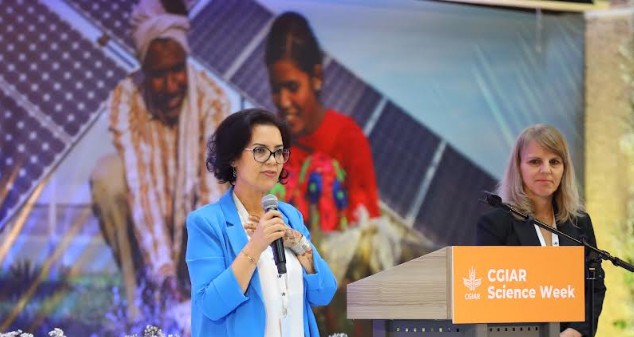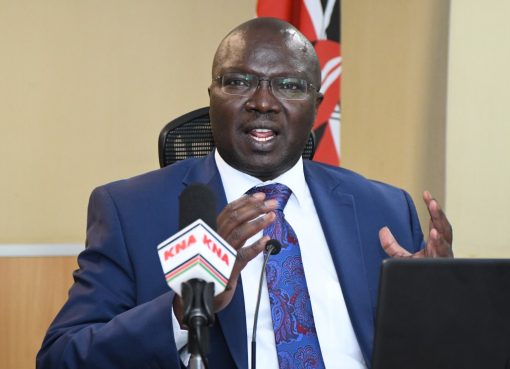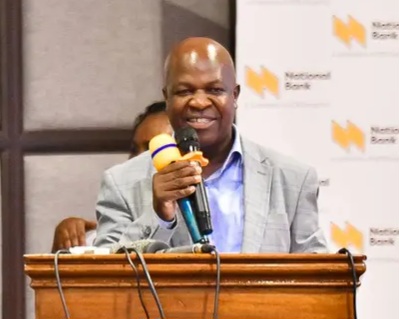In a world facing escalating agricultural and climatic challenges, hunger, and rising inequality, the urgency to transform food systems has never been higher.
In response to these interconnected global challenges, the Consultative Group on International Agricultural Research (CGIAR) has launched its 2025–2030 Research Portfolio at the inaugural CGIAR Science Week 2025 in Nairobi.
The new Research Portfolio serves as a strategic blueprint for deploying CGIAR’s pioneering, partner-led science to transform the food, land, and water systems that sustain global food security and planetary health.
Through global consultations with governments, regional bodies, national research institutions, and local farming communities, CGIAR’s portfolio reflects real-world needs and responds to priorities at national, regional, and global levels.
Speaking during the Research Portfolio launch on Tuesday at the UN Complex, CGIAR Executive Managing Director Ismahane Elouafi said that the new portfolio is designed not just to adapt to today’s pressing needs but to actively shape a more resilient, equitable, and sustainable future.
“Today, I proudly introduce the first-ever research portfolio encapsulating all our Centers’ research: eight science programmes, one scaling programme and four accelerators,” said Elouafi, adding that the portfolio is more than a set of programmes and accelerators; it is a unified platform designed for impact.
She said that the portfolio is a direct response to global calls for action by world leaders, science experts, and farmers on the frontline of today’s agricultural crises.
Building on 50 years of science expertise and its extensive partner networks, this new phase of CGIAR action is more collaborative, focused, and ambitious than ever.
“The Research Portfolio reflects our renewed commitment to not only improving productivity but also nutrition security, livelihoods, climate resilience, environmental sustainability, gender and social equity,” said Elouafi.
“With smallholder farmers in the Global South the hardest hit, the Research Portfolio aims to equip them with the tools, knowledge, and resilience they need to thrive,” she further said.
She divulged that the Portfolio Anchored in frameworks such as the United Nations Sustainable Development Goals, the 2025 Paris Agreement, and the Global Biodiversity Framework, the Research Portfolio reflects the reality that today’s food systems can no longer deliver nutrition, equity, or sustainability for our growing populations.
She said that the design also builds on analysis of CGIAR’s cutting-edge innovations and technologies that factor in current discourse on global agricultural needs and challenges from shifting diets and demographics to climate volatility and geopolitical shocks.
“The result is a forward-looking research and innovation agenda that integrates science, policy, and partnerships to achieve lasting impact,” she said.
Further, she said the portfolio is built on a solid foundation of existing work while expanding into emerging areas of science with potential for impact, helping to lift hundreds of millions of people out of hunger and poverty while supporting low-income producers and consumers for the decades to come.
She revealed that the new research portfolio will involve an estimated investment of US dollars 6 to US dollars 12 billion from now through 2030, and the executive director stressed that while CGIAR will provide the solutions, it is the people, scientists, farmers, and partners in the field who will drive its success.
“The work gets done by you and by many people in the field. It’s crucial that we engage at the personal level to ensure we deliver on our commitments,” she said.
With this new research portfolio, Elouafi said CGIAR is setting the stage for a future where food security is not just a goal but a reality, powered by science, collaboration, and a shared commitment to a more sustainable and resilient global food system.
According to Dr. Sandra Milach, CGIAR Chief Scientist, the portfolio is anchored in frameworks such as the UN Sustainable Development Goals, the 2025 Paris Agreement, and the Global Biodiversity Framework.
Speaking during the science week conference at the UN campus, Dr. Sandra Milach, CGIAR Chief Scientist, said the world is different now, especially with the new current global food and water emergencies
Previously, she said CGIAR has focused on 5 impact areas, namely nutrition, livelihoods, gender, climate, and biodiversity, but today there is a need to develop research that can truly address these issues.
“We will need to build capabilities to be able to address these new problems, even as we develop new areas of expertise by prioritising our interventions and by making very smart decisions,” she said.
Dr. Milach noted that the portfolio is big and that by 2030, they plan to reduce the number of people affected by extreme hunger by 26 per cent.
“We know how to produce more crops and produce more with crops. Our breeding programmes are large and well established. But we will need to look critically at all the staple crops, biofortified crops, and forgotten crops to understand what we need to do with breeding for tomorrow,” she added.
She added that scientists will also generate knowledge and innovations to empower livestock keepers and fishermen, making sustainable animal and aquatic food production core but making sure not to design their research programs solely to produce volume.
Better diets and nutrition, she said, are central to their work. she said, “our innovations will be designed to prevent stunting in children and make healthy diets affordable for all, also tackle malnutrition.”
When it comes to policy innovations, Milach said they are committed and will support partner countries in enshrining best practices in their laws and building on indigenous and traditional food practices.
Another ambition, Milach said, is that by 2030, they will lift 31 million people from extreme poverty, create 92 million jobs, and improve farms across the entire value chain by increasing average income by at least 7 percent.
The CGIAR portfolio is designed to tackle the biodiversity crisis, and with one million species being at risk of extinction, Dr. Milach said by 2030, they also want to deliver innovations that will protect 20 million hectares of land crop expansion, which represents 25 per cent of the size of the Amazon forest.
“Landscapes are multifunctional. Their biomass, the health of their soil, their water, their ecosystems—everything is connected. We need to use less land and recover the greater land. If we develop environmentally sound solutions, we know that sustainable farming will become more accessible, and all this will become more accessible to all farmers as well,” added Dr.Milach.
For decades, Dr. Milach said, millions of seeds have been safeguarded in the international gene banks. “We will now search our roles for the seeds that have the potential to adapt to the pressure ecosystems, and although it might sound almost an impossible task, by using data and leveraging new technologies, we will leapfrog and come to solutions quickly.”
The chief scientist said that they have planned a series of strategic dialogues, one for each of 13 programmes and accelerators.
Milach explained that the Portfolio will benefit food, land and water systems across low- and middle-income countries by accelerating agricultural productivity growth, leading to better-functioning markets, strengthened livelihoods and new job and income opportunities for workers in the agrifood system, especially women.
“CGIAR centers were created to help farmers produce food and, together with our partners, have since saved millions of lives in Africa and Asia” she said.
However, she said that the world is different now, where we are facing climate change, biodiversity loss and new conflicts.
“50 years ago, we turned to science for solutions. Today, we must develop research that can truly address these issues,” she said, adding that we will need to build capabilities to be able to address these new problems.
By Anita Omwenga and Wangari Ndirangu




